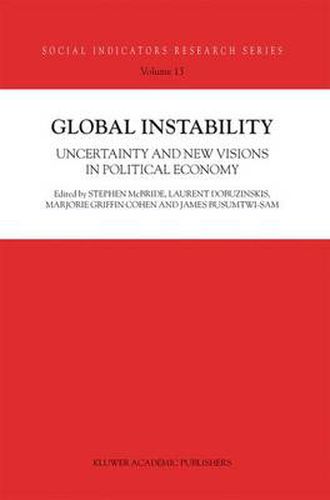Readings Newsletter
Become a Readings Member to make your shopping experience even easier.
Sign in or sign up for free!
You’re not far away from qualifying for FREE standard shipping within Australia
You’ve qualified for FREE standard shipping within Australia
The cart is loading…






This title is printed to order. This book may have been self-published. If so, we cannot guarantee the quality of the content. In the main most books will have gone through the editing process however some may not. We therefore suggest that you be aware of this before ordering this book. If in doubt check either the author or publisher’s details as we are unable to accept any returns unless they are faulty. Please contact us if you have any questions.
Global Instability: Uncertainty and New Visions in Political Economy presents a series of papers that address the political consequences of globalization for states and their populations, while exploring the issue of alternatives to the model of globalization we are presently experiencing. The focus moves from the world of international agreements to the national and sub-national dilemmas that are posed by attempting to manage a set of global developments within a given territory. The initial chapter, by Daniel Drache, explores a still-born post-war international organization, the International Trade Organization, that offers a different vision of how a globally integrated economy might operate. A number of papers then explore the challenges posed by today’s globalization, including currency instability in an environment of financial deregulation, the rights conferred on investors by the North American Free Trade Agreement, and the progressive liberalization of trade in services built into the General Agreement on Trade in Services. The difficulties faced by states are analyzed in a number of chapters that address industrial and social policy issues. A final group of papers explores some theoretical alternatives to a globalized world. Responses at the level of institutions as well as ideas are canvassed and the urgency of the problem is highlighted by Duncan Cameron’s concluding article which argues that we are already living in which he terms a ‘quasi-democracy.’ The various chapters attempt to ground their analysis of instability, uncertainty and change in the real problems that globalization creates for states and peoples, and for those who might attempt to devise alternatives. As a group, these papers offer a unique and timely synthesis of key themes in the political economy of globalization suitable for senior undergraduate and graduate students in political science, economics, and business.
$9.00 standard shipping within Australia
FREE standard shipping within Australia for orders over $100.00
Express & International shipping calculated at checkout
This title is printed to order. This book may have been self-published. If so, we cannot guarantee the quality of the content. In the main most books will have gone through the editing process however some may not. We therefore suggest that you be aware of this before ordering this book. If in doubt check either the author or publisher’s details as we are unable to accept any returns unless they are faulty. Please contact us if you have any questions.
Global Instability: Uncertainty and New Visions in Political Economy presents a series of papers that address the political consequences of globalization for states and their populations, while exploring the issue of alternatives to the model of globalization we are presently experiencing. The focus moves from the world of international agreements to the national and sub-national dilemmas that are posed by attempting to manage a set of global developments within a given territory. The initial chapter, by Daniel Drache, explores a still-born post-war international organization, the International Trade Organization, that offers a different vision of how a globally integrated economy might operate. A number of papers then explore the challenges posed by today’s globalization, including currency instability in an environment of financial deregulation, the rights conferred on investors by the North American Free Trade Agreement, and the progressive liberalization of trade in services built into the General Agreement on Trade in Services. The difficulties faced by states are analyzed in a number of chapters that address industrial and social policy issues. A final group of papers explores some theoretical alternatives to a globalized world. Responses at the level of institutions as well as ideas are canvassed and the urgency of the problem is highlighted by Duncan Cameron’s concluding article which argues that we are already living in which he terms a ‘quasi-democracy.’ The various chapters attempt to ground their analysis of instability, uncertainty and change in the real problems that globalization creates for states and peoples, and for those who might attempt to devise alternatives. As a group, these papers offer a unique and timely synthesis of key themes in the political economy of globalization suitable for senior undergraduate and graduate students in political science, economics, and business.